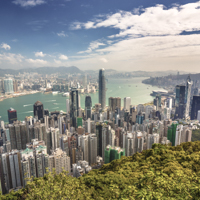
10 October 2017 - Why have Hong Kong’s housing prices continued to increase while Singapore’s prices are in decline? Both economies followed similar growth trajectories and are generally perceived as comparable rivals internationally. While the two markets share certain similarities – cultural context, economic structure, territory and population size – the two governments approach housing issues with completely different mindsets. Looking at historical housing statistics, the Singaporean government adopted a centralized approach to subsidizing home purchases whereas the HKSAR government seeks to leave housing prices to the market and minimize regulatory impact. In this article, we’ll describe how the two approaches to property markets differ.
The Role of Government in Housing Markets
With little state influence, the Hong Kong property market is chiefly determined by the private sector. According to the Transport and Housing Bureau, in 2016, about 30 percent of the people of Hong Kong lived in public rental housing flats. In terms of home ownership rate, 45.6 percent of the Hong Kong residents own their homes, whereas the other half of the population relies on rental property.
In contrast, the Singapore housing market is state-dominated. More than 80 percent of the Singaporean population live in public housing flats, whereby the state plays a decisive role in pricing these subsidized apartments. According to Statistics Singapore, under active government intervention, the home ownership rate of Singapore has been maintained at higher than 90 percent since 2012.
Differences in Public Housing Policy
Owing to a small-state policy, the supply of public housing in Hong Kong is relatively scarce and government subsidies of home purchases are limited. The threshold for applying for public rental housing is fairly strict, defining both a maximum income limit and a total net asset limit. For a family of four, the income ceiling is HK$27,050, which is 20.1 percent lower than the median monthly household income of the same family size in 2014 (HK$32,500). With soaring private property prices, eligible applicants face a long waiting list with an average waiting period of 4.7 years.

In contrast, Singapore has a comparably large population living in public housing. The Singaporean government offers a variety of grants and schemes to assist home ownership. This is the most prominent difference in the two governments’ approaches to public housing policy. In Singapore, not only are the people permitted to finance their home purchase with retirement savings, they are also entitled to a concessionary interest rate for housing loans and a first-time home-buyer grant of up to S$40,000 (HK$230,000). In terms of eligibility, Singapore has a more relaxed income ceiling than that of Hong Kong. The monthly household income ceiling for a three-room flat is S$12,000 (HK$68,900), which is 35.6 percent higher than the median monthly household income of S$8,846 (HK$50,790). For the resale of these public flats, there are no income restrictions.
Privately Owned Property Prices
To address the heated residential property market, the HKSAR government is more inclined to adopting demand-side management measures. Over the years, the government has introduced several stamp duties and adjusted the rates in an attempt to mitigate the demand for privately owned property. In 2010, the government first introduced the Special Stamp Duty (SSD) – ranging from 5 percent to 20 percent of the property market value – to curb excessive property speculation and trading activities. In 2012, the government raised the SSD by 5 percent and imposed another 15 percent Buyers’ Stamp Duty (BSD) on corporate and non-local buyers. In 2016, the Ad Valorem Stamp Duty (AVSD) was raised to a flat rate of 15 percent for properties purchased by non-first-time buyers. In addition to stamp duty, since 2009, the government has launched several mortgage-tightening measures, namely lowering the loan-to-value (LTV) ratio, in an attempt to cool down the housing market. While these countercyclical policies have seen some immediate effects, their impacts tended to be temporary and didn’t result in lower cost housing in the long run.

Hong Kong has been ranked as the world’s most expensive housing market for the past 7 years, and private property prices have continued to escalate for 15 successive months. According to data from the Rating and Valuation Department, the monthly housing index in June this year recorded a 0.69 percent increase from May, and a 21.6 percent surge on a year-on-year basis. For a 500 square-foot apartment in urban areas, the standard 30 percent down payment would cost more than HK$2 million, representing approx. 9 years of pretax income based on the city’s median monthly wage of HK$18,400. Although this measure of affordability focuses on income vs wealth (which has increased faster than income given people’s propensity for capital investments in Hong Kong), it nonetheless contributes to general pessimism over purchasing a property in Hong Kong.
On the other hand, Singapore took on a supply-side approach to rising housing demand. In contrast to Hong Kong’s hilly terrain, Singapore’s geographical advantage of a flat structure allows for relative ease of expansion for residential property development. In 2017 alone, four sites were confirmed to be dedicated to building private housing, yielding an extra supply of 2,840 flats in the second half of 2017. With the increased housing supply going hand-in-hand with the subsidies for home purchases, property price levels have declined over time.
In Singapore, the property price index has seen fifteen straight quarters of decline as the government has proactively reined in the market. Since 2013, Singapore has experienced a series of stringent property market curbs imposed by the government, including a higher stamp duty and a cap on the home-buyers’ debt-repayment. Largely due to steadfast government efforts, property values have fallen 11.7 percent from their pinnacle in 2013.
Perspectives on rising or declining property prices naturally depend on a person’s position. Property owners view rising prices favourably, while property renters do not. However, given roughly half of Hong Kong’s population do not own their residence, there have been calls for many years urging the HKSAR government to find other ways to curb the persistent growth of home prices, or at least improve the ability for those with lower incomes to purchase a property. The juxtaposition of Hong Kong and Singapore’s property markets offer some ideas on how government subsidies could benefit housing needs of the population. Nevertheless, Singapore’s policies should not be read as a successful formula that can be replicated and applied to Hong Kong’s housing situation. Whether or not to further increase government intervention in the property market (and how) is a more complex political and economic issue that cannot be easily summarized or solved. However, tradeoffs will be necessary if Hong Kong is to maintain a sustainable supply of affordable housing to support a well-established market economy in the long run.



